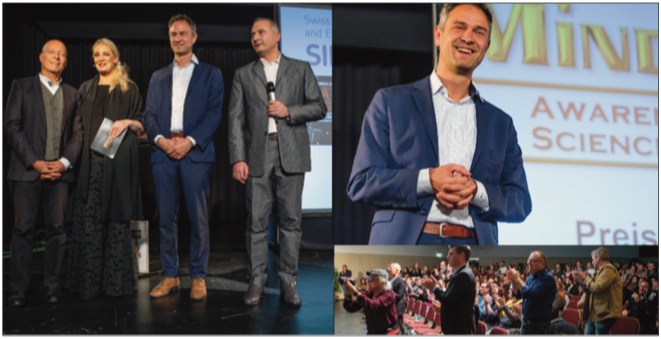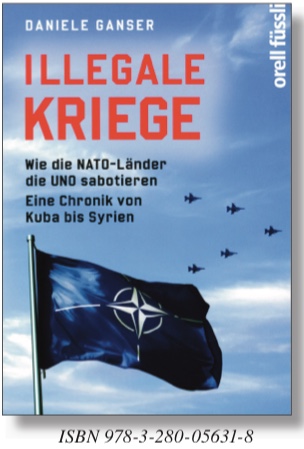“Mind Award” to Daniele Ganser
“Mind Award” to Daniele Ganser
by Doris Feigenbutz
On 26 March, Dr Daniele Ganser received the “Mind Award” in the City Hall of the German town Montabaur for his research on peace. This international award for Awareness, Education, Science, Art and Peace was founded in 2010 by Achim Kunst, a Montabaur management consultant. The award is given to individuals and actions of worldwide importance who promote education and increase knowledge in a holistic sense. Along these lines, Dr. Franz Alt and Götz Werner, among others, have received awards so far. Daniele Ganser was honoured for his courageous uncovering of unpleasant truths – even at the cost of personal disadvantages.

The laudatory speech was presented by the 2014 winner, the physician and psychotherapist Dr Rüdiger Dahlke. He paid tribute to Daniele Ganser’s admirable attitude to follow his own conscience even in difficult times, even if his truths did not correspond to the mainstream or even triggered counter-reactions. Daniele Ganser had never been refuted, but had been ignored. After seeing their reputation in danger, the universities in Basel and Zurich separated from him. When Daniele Ganser uncovered unpleasant truths about 9/11-research, the universities were more interested in their “good reputation” than in backing their peace researcher. At the cost of truth, however, only someone with strong support can bear losing his job, in this case support by his wife and by a large community of supporters. As a holistic physician specialising in psychosomatics, Dr Dahlke said, “People who are offended but who do not advocate themselves get sick. Sticking to one’s own stance is the healthier way”. If the facts and findings then lead to an awakening of other people, this is the biggest health benefit.
Daniele Ganser gave thanks for this appreciation and added advise for all people in similar conflicts: “Discuss with your closest colleagues and then stick to your beliefs”. He said that he accepts this award in place of all those who take a stand for peace. Then he took the opportunity to rouse the more than 600 attendants of all ages in his habitual lively manner. Under the motto “Germany is arming up”, he explained how Germany’s arms expenditure – in government jargon “the defence budget” – is planned to be increased imperceptibly from around 40 to around 80 billion Euros, bypassing the taxpayer. The additional 40 billion is not a given figure, but is derived from a target mark of 2%. Under Chancellor Merkel, the budget has already been increased from 1.18% to 1.37%. She had already promised 1.5 %. To those who tried to calculate how the difference of not even 1 % could result in a 40 billion Euro increase, Daniele Ganser showed how the thinking of the population is manipulated. Press releases would mention 2% of GDP. This abbreviation for gross domestic product sounds friendly. In Germany it actually amounted to around 4,200 billion euros in 2018. Anyone who now caught himself thinking “Aha”, as he somehow assumed that it was 2% of the federal budget of about 343 billion euros in 2018, had already been taken in by the cover-ups. The gross domestic product is the total economic output of a country’s population in one year. From this sum a further 40 billion is to be diverted, without the population being directly informed about it or even asked about it.
Germany is at the beginning of a massive armament
Daniele Ganser commented: “We are at the beginning of a massive rearmament without being aware of it.” This trick is working in Germany because it has a strong economy, it is reportedly the largest economy in Europe. It became clearer: Budgeting this amount, Germany moves from 9th place to 3rd place in the worldwide ranking of nations that invest in war. In comparing it with his country of origin, Switzerland, he said such a thing would not happen in Switzerland without a referendum. He was sure that also in Germany a large majority would reject it. But who is in charge here In Germany? Then followed a lesson in institutional studies.
The 2 % is requested by US President Donald Trump and NATO – and by the way, over here also loudly by the new US Ambassador Richard Grenell. Wolfgang Kubicki (FDP), vice-president of the German Bundestag, was so outraged that he requested that Grenell had to be expelled immediately.


The NATO chain of command ends in the Pentagon
NATO is a military alliance founded in Washington in 1949. In the meantime, 29 countries have joined. It is led by NATO Secretary General Jens Stoltenberg, a European under the command of Trump. The highest US general, however, is Curtis Scaparrotti. He also reports directly to the US President in the chain of command. He heads the United States European Command based in Stuttgart. There is the workplace of the highest US general.
Nato’s headquarter is in the Pentagon, so the USA rules the NATO. Daniele Ganser advised that Germany should leave Nato and not send troops abroad in memory of its own history. He also recalled the UN’s ban on violence. The UN Charter prohibids war, it must be mentioned again and again. In Munich, 3,500 people demonstrated against the increase of the arms budget. Like Daniele Ganser, they were of the opinion that it was better to use the money for one’s own purposes.
Mindfulness helps against manipulation
Towards the end, he came back to talking about the tampering of thoughts, manipulations that prevent you from realising unpleasant things. The means by which this is achieved is called “frames”. A lot of money is invested in the creation of “frames”, whereby it is often only the choice of words, the use of certain terms, having a positive (or also negative) background, which lead the thoughts to an intended goal. The means against it is mindfulness. One must carefully observe one’s own thoughts. What one thinks again and again gets finally reminiscent. “So, we should think about peace more often.” His lecture ended with a standing ovation. •